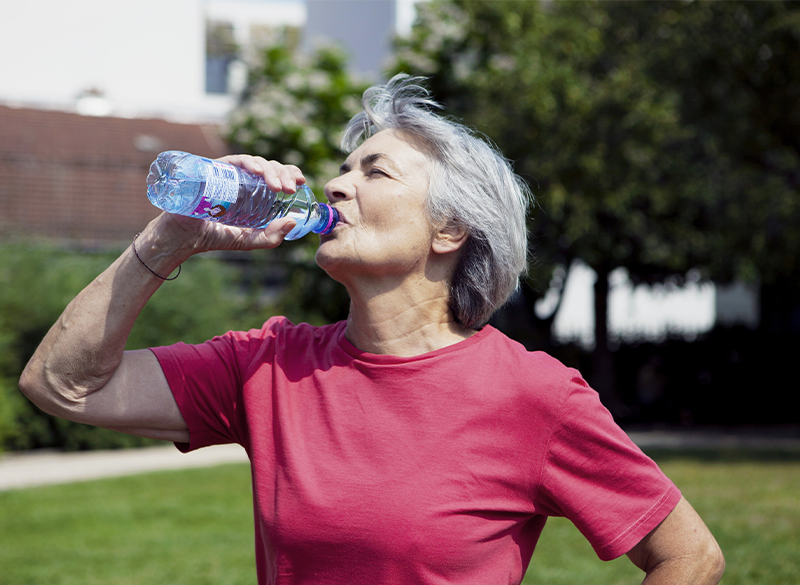Dehydration in the Elderly: An Invisible Danger

Why is Water, the Source of Life, Neglected in Old Age?
Research shows that approximately 40% of elderly individuals face chronic dehydration and its associated problems. Highlighting the serious issues that reduced water intake in old age can cause, Prof. Dr. Mehtap Kaçar explained, “When the body becomes dehydrated, the brain sends a thirst signal, prompting the need to drink water. However, with aging, the nervous system’s ability to perform this function weakens, and by the time elderly individuals feel thirsty, they have likely already been dehydrated for a long period.”.
Prof. Dr. Mehtap Kaçar, Vice Dean of the Faculty of Medicine at Yeditepe University and a faculty member in the Department of Physiology, provided insight into the importance of water consumption in old age.
Water Ensures the Proper Functioning of the Body
“Water is the source of life, and for this reason, it must be considered distinct from all other nutrients,” said Prof. Dr. Kaçar. “Sixty percent of our body is composed of water. Water helps transport nutrients to our cells, regulates body temperature and blood pressure, prevents infections, and ensures the proper functioning of organs. Unsurprisingly, adults who maintain good hydration tend to appear healthier and develop fewer chronic conditions.”
Thirst Sensation Decreases with Age
Drawing attention to the challenges elderly adults face in drinking sufficient water, Prof. Dr. Kaçar continued:
“The primary reason for this issue is the decreased sensation of thirst with age. Dehydration occurs when the body loses water, and physiologically, this triggers the thirst center in the brain, prompting the behavior of drinking water through signals sent to relevant parts of the body. However, aging weakens this neural function, and when elderly individuals feel thirsty, they have already been dehydrated for a long time. Other contributing factors include weakened swallowing and throat muscles, making it difficult to drink safely, as well as conditions such as dementia or diabetes and medications that increase water loss.”
“It Can Worsen Chronic Conditions”
Prof. Dr. Kaçar outlined the symptoms of dehydration:
“Signs of dehydration include dark yellow urine, fatigue, low blood pressure, dizziness, irritability, confusion, short-term memory loss, dry mouth, constipation, and muscle cramps. Prolonged dehydration can exacerbate chronic conditions in the elderly or create more severe health problems, such as blood clots, heat strokes, kidney stones, reduced blood volume, gallstones, epileptic seizures caused by electrolyte imbalances, shock, and urinary tract infections.”
Daily Water Intake Recommendations
Prof. Dr. Kaçar also explained the recommended daily water intake:
“To prevent dehydration, fluids should be consumed gradually throughout the day. Men should drink an average of 15 glasses of water daily, while women should aim for 12 glasses. This amount can vary depending on age, gender, weather conditions, and physical activity. For elderly individuals, the recommended intake may differ, but they should generally drink water based on their body weight. For example, an elderly person weighing 67 kilograms should aim to consume 1,500–2,250 milliliters of water daily.”
“Family Support is Crucial”
Highlighting the role of families and professional caregivers in preventing dehydration in older adults, Prof. Dr. Kaçar offered the following advice:
“Encouraging increased water consumption can be challenging, but you can get creative by offering new liquid-based sources such as fruits, sugar-free drinks, or frozen snacks. Keep a water bottle near your elderly loved one to make sipping water throughout the day easier and to track their daily intake. If they prefer cold water, always have a pitcher ready in the refrigerator. You can also enhance the flavor by adding lemon or fresh mint leaves. Homemade soups or liquid meals can be served during lunch or snacks. Combining water with fruits to make smoothies, lemonade, or compotes is a good option in hot weather. Encourage them to drink a glass of water with their medications. Replace sugary beverages with water. Identify their favorite drink and include water-rich fruits and vegetables such as melons, strawberries, citrus fruits, lettuce, tomatoes, peppers, and cucumbers. Limit alcohol intake to one drink per day for women and two for men, and restrict tea or coffee to 1–2 cups daily. Set reminders for hourly water breaks, and always include water with meals or snacks. Establish a water-drinking routine.”
“Take Measures to Prevent Aspiration”
Prof. Dr. Kaçar highlighted the heightened risk of aspiration in elderly individuals, where food or liquids mistakenly enter the airway or lungs. This risk increases due to tooth loss, weakened chewing and throat muscles, impaired nerve signaling, and chronic health conditions often associated with aging. She underscored the importance of identifying and addressing aspiration risks, explaining:
“If an elderly person frequently coughs, chokes, gags, vomits, or clears their throat while eating or drinking, they may be experiencing aspiration. Certain steps can be taken to help prevent this. For instance, drinking water through a straw and gently tilting the head forward can make swallowing easier. Eating and drinking slowly, avoiding talking or turning the head during meals, and minimizing distractions like phone calls or TV can also reduce the risk. Cutting food into small, manageable pieces, chewing thoroughly before swallowing, and staying upright for at least an hour after eating or drinking are simple yet effective measures. Additionally, opting for thicker soups instead of thin ones can further lower the chance of aspiration. These practical adjustments can significantly improve safety and comfort during meals.”
Press: Habertürk | Sözcü | CNN Türk | İnternet Haber | KRT TV | Türkiye Gazetesi | Haberler | Son Dakika | DHA | AA